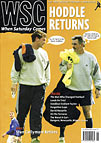 Italian football, beset by corruption and cynicism, is now suffering from a frightening new wave of hooliganism. Richard Mason reports
Italian football, beset by corruption and cynicism, is now suffering from a frightening new wave of hooliganism. Richard Mason reports
Few people paid much attention to the 1-1 draw between Atalanta and Pistoiese in their Italian Cup match played on August 20. In fact, for Italian football, it was the start of an annus horribilis. Two days after the game there were reports of strange betting patterns involving relatives of some of those playing, and seven months later six players, four of them from Atalanta, were suspended for up to a year.
Strangely, they were “only” found guilty of knowing the match was fixed and not reporting it. Most people think that if the match was fixed, the guilty have got off while the relatively innocent have been punished. The convicted players are appealing, but suspicions about the match will remain. In the cynical context of Italian football, all this should surprise only the terminally naive. For there is a general feeling that many matches are fixed in some way or other.
Confirmation of many people’s suspicions came when eccentric Perugia coach Serse Cosmi, believing he was off camera, revealed on TV some of the secrets of the southern group of Serie C1. In particular, he alleged that one club, Juve Stabia, fixed several games at the end of the season. When Cosmi’s remarks were broadcast, he defended himself by saying it was just “bar talk” but no one was fooled.
Linked with suspicions of corruption is the passport scandal, which is growing bigger all the time. If it were limited to Italy, some way would probably be found to save the face of the big clubs, but with FIFA and UEFA heavily involved, some very important people are starting to get worried. How can Atalanta and Pistoiese be punished for an offence which, while serious, did not influence the outcome of a championship, while Lazio, for instance, who probably cheated to win the scudetto, remain unscathed?
And then, worst of all, there is violence. Hooliganism is now rife, and every week there are serious incidents at, on average, half-a-dozen games. From Serie A (Reggina v Brescia) to Serie C1 (premeditated violence in Pisa v Livorno) and C2 (Foggia v Tricase) games have been abandoned. At Inter’s UEFA Cup game against Alavés (also called off) fans hurled seats on to the pitch and tried to attack the directors’ box. On the same weekend in March a referee was attacked by a mob after Brescia’s game against Lazio, while a Napoli fan was savagely beaten by Lecce hooligans.
Napoli’s own ground has been closed for two games after missile-throwing incidents. At Atalanta v Vicenza, a policeman nearly lost a hand when a device thrown from the visitors’ end blew up as he was carrying it away from the area which holds wheelchair fans. And so on. This is just a brief taste of a much longer list of incidents, many very serious. Respect for opposing fans is virtually non-existent. The atmosphere inside stadiums is hostile – there is little sense that you are there to enjoy an afternoon’s sport. Napoli’s chief executive Corrado Ferlaino, himself attacked by fans after sacking coach Zdenek Zeman, said: “I don’t want to scare anyone but the problem is really big.”
The players, too, have spoken out against hooliganism. “Those who degrade football every Sunday do so with impunity,” said the players’ union chief executive, Sergio Campana. But he might have done better to address the violence perpetrated by his own members. On November 19, Modena’s Francesco Bertolotti nearly died when he suffered a brain haemorrhage after being punched by Como’s Massimiliano Ferrigno, who was suspended for three years. A few weeks later, Paolo Montero of Juventus was seen punching Inter’s Luigi Di Biagio, and on March 25, there was another serious incident involving two players after the C1 derby between Brescello and Reggiana.
Italian football is in crisis and the failure of its clubs in Europe is the least of its worries. It is a crisis of credibility, in a football world that grows madder by the day and seems quite unable to learn from its mistakes. Then again, what can you expect from a country that is almost certainly going to elect Silvio Berlusconi as its prime minister on May 13?
From WSC 171 May 2001. What was happening this month